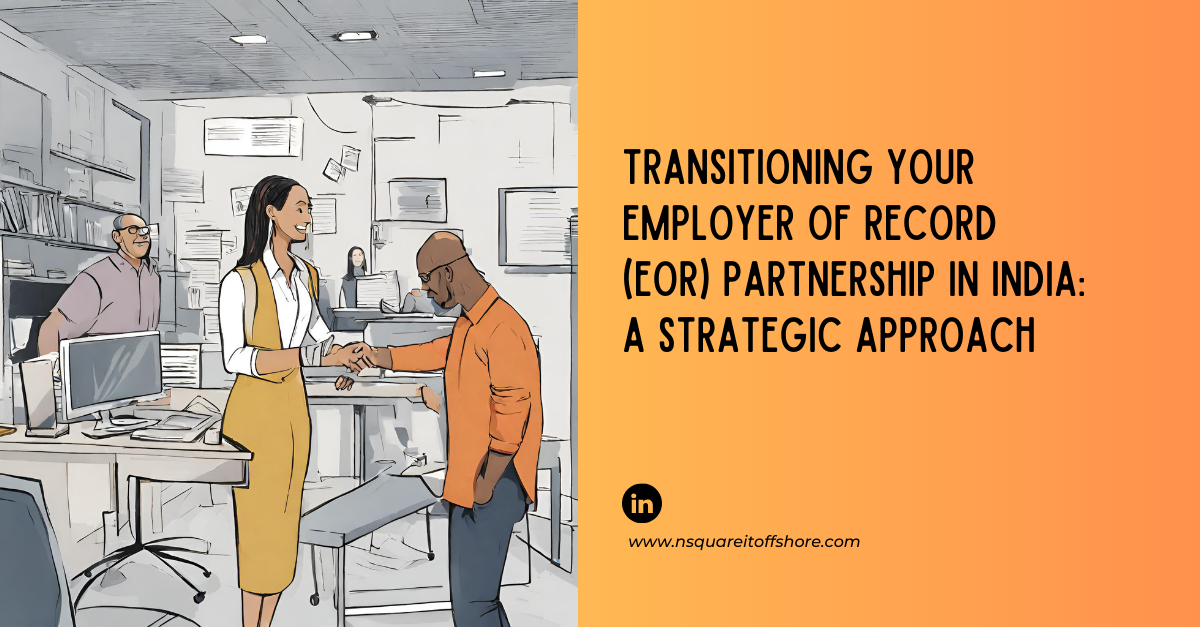Transitioning Your Employer of Record (EOR) Partnership in India: A Strategic Approach
December 18th, 2023

Employer of Record (EOR) partnerships play a pivotal role in managing global workforces, especially in a dynamic and diverse market like India. However, circumstances may arise where reassessing and potentially changing your EOR partner becomes necessary. Here’s a guide on navigating this decision effectively:
-
Evolving Business Landscape:
India’s business environment is constantly evolving. If your current EOR partner isn’t adapting to new regulations, market shifts, or technological advancements, it might hinder your operations.
-
Compliance Challenges:
India’s regulatory landscape can be intricate. If your EOR partner struggles to maintain compliance with local laws or faces recurring issues in navigating complex regulations, it poses risks to your business.
-
Service Quality and Reliability:
Consistent service quality and reliability are paramount. If your current EOR partner fails to deliver timely payroll management, accurate tax filings, or comprehensive HR support, it could impact your operations.
-
Expertise and Local Understanding:
India’s diverse culture and market nuances demand an EOR partner with local expertise. If your current partner lacks a deep understanding of regional intricacies or struggles with cultural alignment, it might affect your business’s success.
-
Communication and Collaboration:
Effective communication and collaboration are critical for seamless operations. If there are persistent communication gaps or a lack of collaborative efforts from your EOR partner, it can lead to misunderstandings and delays.
-
Technology Integration:
In a tech-driven era, embracing innovative solutions is key. If your EOR partner lacks modern technology integration or fails to keep up with digital advancements, it might impact your operational efficiency.
-
Cost Efficiency and Value Proposition:
Assess whether the cost of services aligns with the value provided. If you find discrepancies or better value propositions elsewhere without compromising quality, it might be time for a change.
-
Cultural Alignment:
Cultural compatibility between your organization and the EOR partner is crucial. If there’s a significant mismatch in values or work culture, it can lead to conflicts and hinder collaboration.
-
Feedback and Evaluation:
Regularly gather feedback from internal stakeholders. If consistent dissatisfaction or unaddressed improvement areas persist with your current EOR partner, reconsideration is essential.
-
Strategic Vision Alignment:
Ensure your EOR partner aligns with your long-term strategic vision. If there’s a divergence in objectives or a lack of alignment, achieving your business goals might become challenging.
Making a shift in your EOR partnership requires a strategic approach. Assess the existing partnership thoroughly, explore alternatives, and ensure a smooth transition to safeguard your business’s interests and operations.
By proactively addressing these considerations and seeking a partner that aligns with your business’s unique needs and growth trajectory, you pave the way for a successful EOR partnership in India. Remember, the right partnership can significantly contribute to your business’s success in this vibrant market.